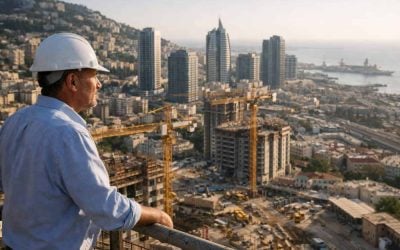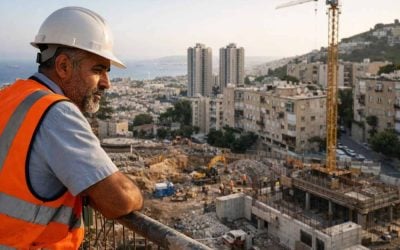1. Northern Israel Sees Boost Through Major Urban Renewal Projects
Real estate developer Av-Gad Holdings has recently announced significant progress in revitalizing residential areas in Northern Israel, particularly around the Krayot suburbs of Haifa Bay and the city of Nof HaGalil (formerly known as Nazareth Illit). Over the past month alone, the company successfully obtained approval from tenants in seven different neighborhoods to proceed with redevelopment projects. Collectively, these urban renewal initiatives are expected to add approximately 4,200 new homes.
These projects are part of broader governmental strategies aimed at stimulating economic growth and modernizing aging neighborhoods in Northern Israel, traditionally underserved compared to central regions. The effort is seen as critical for attracting younger residents, improving local housing stock, and alleviating the housing shortage in Israel’s rapidly growing urban areas.
2. Southern Israel’s Property Market Experiences Remarkable Growth
The southern cities of Beersheba, Dimona, and Yeruham have become real estate hotspots, driven by surging housing prices throughout 2024 and into early 2025. Beersheba saw property prices rise roughly 16%, while Dimona recorded even sharper increases, approaching nearly 20%. The rapid appreciation in the southern region’s housing market is largely fueled by a combination of relatively affordable initial prices, an influx of domestic buyers seeking cheaper alternatives to Tel Aviv and Jerusalem, and targeted governmental policies offering incentives to homebuyers and developers in the Negev.
This development aligns with Israel’s strategic push to develop the southern region through infrastructure investments, educational institution expansions, and industrial development initiatives.
3. Sharp Rise in Foreign Investment in Israeli Properties
Foreign investment in Israel’s real estate sector experienced a substantial upswing, with 2023 figures revealing approximately 48% more property purchases by overseas buyers compared to 2022. Experts attribute this growth to favorable economic conditions, such as a depreciating Israeli shekel making investments cheaper for foreign currency holders, and historically low borrowing rates offered by Israeli banks.
Jerusalem remains the prime destination among international investors, reflecting its cultural and religious appeal. However, there is also notable and growing interest in suburban cities such as Modi’in and Givat Shmuel, driven by their proximity to central urban areas, developing infrastructure, and appealing quality of life factors.
4. Housing Sales Slowdown Contrasts With Persistent Price Increases
Despite a noticeable reduction in the pace of home sales—January 2025 recorded the lowest monthly home sale figures in over ten years—the average price of homes across Israel continues to rise steadily, registering annual increases between 6% and 8%. This paradox of declining sales volume yet persistent price growth is attributed primarily to ongoing housing shortages, demographic pressures from Israel’s growing population, and sustained demand from investors and affluent homebuyers, particularly in urban cores like Tel Aviv.
The affordability crisis has deepened as a result, creating significant hurdles for first-time buyers and lower-income families, prompting policymakers to consider various mechanisms to stabilize the housing market.
5. New Mortgage Regulations Aim to Curb Risky Developer Financing
In response to increasing concerns about financial risks linked to new housing developments, the Bank of Israel introduced stricter regulations governing mortgages and developer-sponsored loan schemes. Specifically, until the end of 2026, developers are now restricted from extensively offering “balloon” payments or other delayed-payment arrangements, financing methods that had recently become widespread in approximately half of new home transactions.
Balloon payments refer to financing structures where borrowers initially make minimal or no repayments, with substantial lump-sum amounts due at later stages. Such arrangements, while initially attractive due to low upfront costs, carry heightened default risks, particularly if property values stagnate or decline. By imposing these restrictions, the Bank of Israel seeks to protect buyers from potential future financial distress and promote a more stable lending environment.
6. Regulatory Changes in the Real Estate Brokerage Industry
Israel recently enacted new regulatory standards known as the Real Estate Brokers (Ethics and Professional Duties) Regulations, 2024, significantly enhancing the transparency and accountability of real estate brokers. These rules require brokers to fully disclose any dual representation (acting simultaneously for buyers and sellers), provide complete and detailed property descriptions, comply strictly with truthful advertising standards, and prohibit undisclosed or hidden fees.
Implemented by the Justice Ministry, these reforms are expected to increase consumer protection, enhance the professionalism of the real estate brokerage sector, and align local practices more closely with global ethical standards.
7. Tax Adjustments Target Speculative Real Estate Investments
The Finance Ministry introduced adjustments to Israel’s real estate taxation regime as part of the national budget enacted during the recent military conflict. Specifically, the government decided to freeze inflation-adjusted increases on thresholds for property purchase tax exemptions and capital gains tax brackets until 2027.
By maintaining these thresholds at fixed levels, officials anticipate that rising home prices—unmatched by corresponding tax exemption increases—will result in a higher proportion of property transactions becoming taxable. This policy aims to discourage speculative investing, increase tax revenues, and balance the budget deficits accumulated from security-related spending.
8. Special Housing Allocations for Minority Military Veterans
In recognition of military service by Israel’s Druze and Circassian communities, the Israel Land Authority (ILA) recently introduced a specialized housing program, initially allocating around 215 discounted residential plots in the Golan Heights specifically to veterans of these minority groups through a lottery system. This initiative is part of a comprehensive, five-year development plan totaling around NIS 4 billion aimed at economically empowering minority communities, providing affordable housing, and fostering regional development, particularly in northern regions and the Negev.
9. Major Retail Development Draws Huge Crowds in Central Israel
Israel’s largest outdoor retail mall, BIG Fashion Glilot, opened recently near Tel Aviv, attracting enormous crowds during its first weekend—upwards of 155,000 visitors, creating substantial traffic disruptions around the Glilot Junction area. Initial sales figures have been extremely strong, reflecting pent-up consumer spending and enthusiasm. However, following the initial surge, visitor numbers have moderated, raising questions among retail industry analysts about whether such popularity will sustain in the longer term.
10. Commercial Real Estate Faces Persistent Challenges
Despite retail enthusiasm, Tel Aviv’s office real estate sector remains under pressure, particularly in tech-dominated areas such as Ramat HaHayal, where vacancy rates remain elevated due to a broader economic slowdown over the past year. However, some positive signs are emerging, with coworking spaces recently leasing roughly 4,400 square meters in the city, indicating potential early signs of market stabilization.
11. High-Profile Land Acquisition Highlights Market Confidence
A major real estate transaction in Tel Aviv’s Bitzaron neighborhood underscored ongoing investor confidence despite market uncertainties. Cybersecurity giant Check Point Software, partnering with developer Israel Canada, acquired a large 14-dunam plot previously owned by the Israel Electric Corporation for approximately NIS 830 million ($226 million). The site is planned for a large-scale mixed-use development consisting of around 315 residential units and over 62,000 square meters of office space. Check Point plans to construct its corporate headquarters there, highlighting confidence in Tel Aviv’s long-term economic resilience.
These multifaceted developments reflect the complexity and dynamism currently shaping Israel’s real estate landscape, influenced significantly by regional development strategies, investor behavior, regulatory adjustments, and shifting market dynamics.




